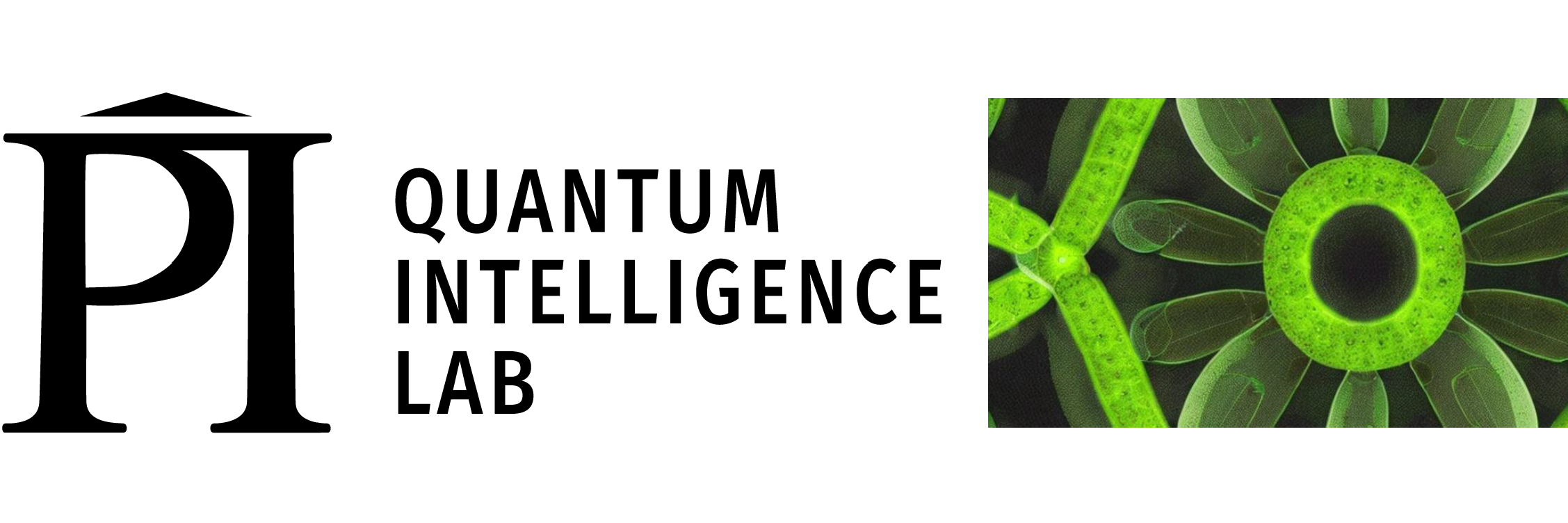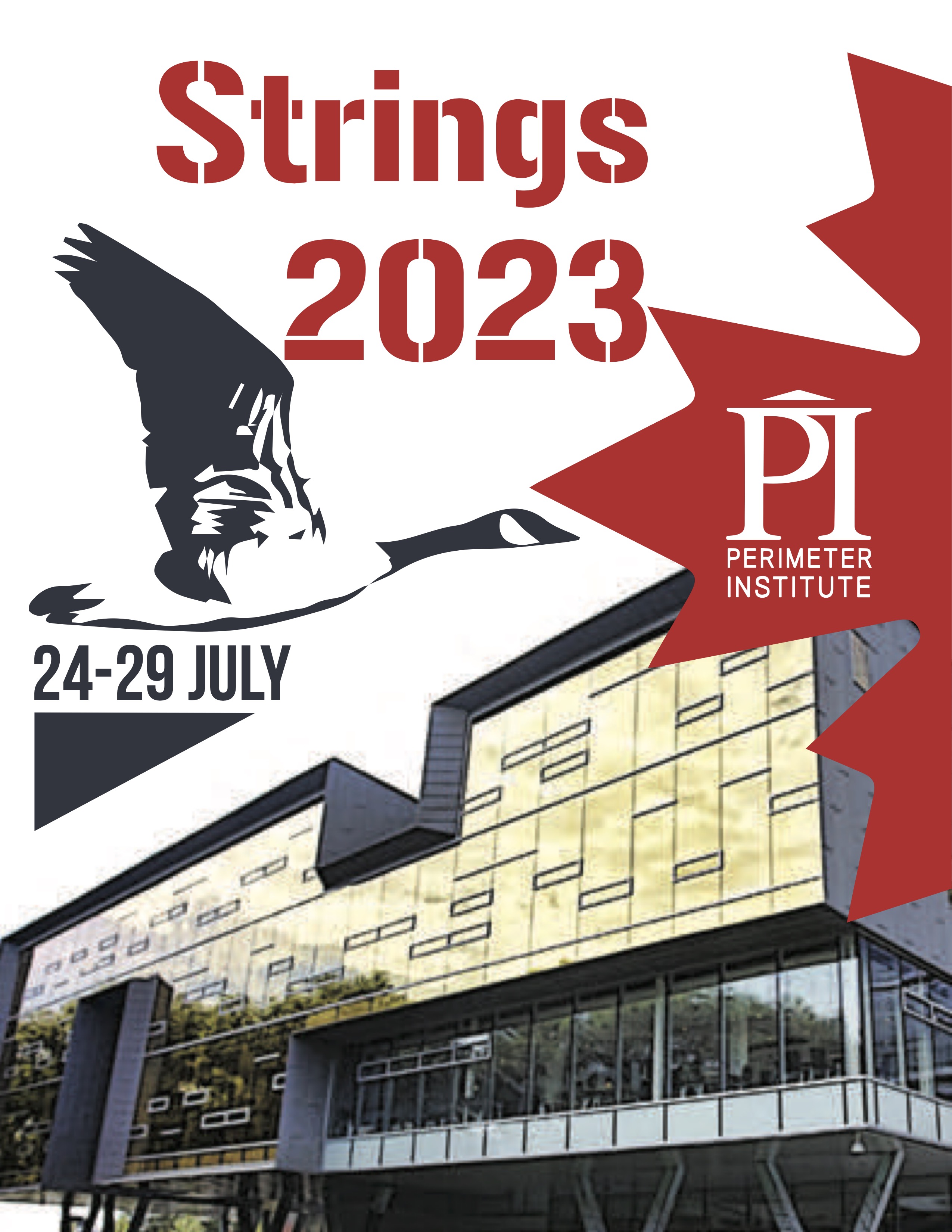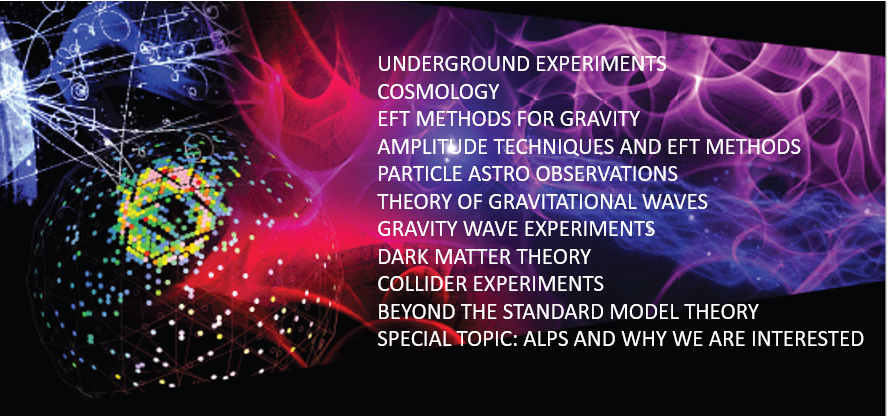Format results
-
Talk
-
-
Talk
-
Talk 44 - Large N von Neumann Algebras and the renormalization of Newton's constant
Elliott Gesteau California Institute of Technology (Caltech)
-
Talk 88 - Type II_1 algebras for local subregions in quantum gravity
Antony Speranza University of Amsterdam
-
Talk 124 - von Neumann algebras in JT gravity with matter
David Kolchmeyer Massachusetts Institute of Technology
-
Talk 61 - Horizons are Watching You
Gautam Satishchandran -
An SYK model with a scaling similarity.
Juan Maldacena Institute for Advanced Study (IAS) - School of Natural Sciences (SNS)
-
Petz recovery from subsystems in conformal field theory
Shreya Vardhan Stanford University
-
-
-
-
Talk
-
-
Talk
-
Opening Remarks
Robert Myers Perimeter Institute for Theoretical Physics
-
-
Research Talk 2 - Burns holography
Atul Sharma Harvard University
-
Research Talk 3 - Swampland and a Unification of the Dark Sector
Cumrun Vafa Harvard University
-
Research Talk 4 - A universal pattern at infinite field distance
Irene Valenzuela -
-
Research Talk 5 - Crossing beyond scattering amplitudes
Hofie Hannesdottir -
-
-
Talk
-
-
Talk
-
Talk
-
Universal Prethermal Dynamics in Quantum Magnets and Fracton Fluids - Class 03 of 03
Joaquin Rodriguez-Nieva -
-
-
-
-
-
Universal Prethermal Dynamics in Quantum Magnets and Fracton Fluids - Class 02 of 03
Joaquin Rodriguez-Nieva -
-
-
Talk
-
-
Talk
-
Hybridization induced superconductivity in non-interacting chains
Mucio Continentino -
-
-
Multipolar spin liquid in an exactly solvable model for J = 3/2 moments
Vanuildo S. Carvalho -
-
-
-
-
-
Talk
-
-
-
-
-
-
-
-
Wilson loops and integrability in Chern-Simons-matter theories
Diego Hernán Correa
-
-
Talk
-
-
[Virtual] Exploring Quantum Science with Machine Learning
Di Luo Massachusetts Institute of Technology (MIT)
-
Near Term Distributed Quantum Computation using Optimal Auxiliary Encoding
Abigail McClain Gomez -
-
-
Automated Characterization of Engineered Quantum Materials
Eliska Greplova Delft University of Technology
-
-
-
-
Talk
-
-
-
It from Qubit 2023
The final meeting of It from Qubit: Simons Collaboration on Quantum Fields, Gravity, and Information will be devoted to recent developments at the interface of fundamental physics and quantum information theory, spanning topics such as
- chaos and thermalization in many-body systems and their realization in quantum gravity;
- information-theoretic constraints on quantum field theories and their RG flows and symmetries;
- gravitational wormholes and their information-theoretic implications;
- calculable lower-dimensional models of quantum gravity; the entanglement structure of semi-classical states in quantum gravity;
- quantum error-correcting codes in quantum field theory and quantum gravity;
- complexity in field theory and gravity;
- the black-hole information puzzle;
- quantum simulation of quantum field theories and quantum gravity.
Recorded talks: https://pirsa.org/C23021
Territorial Land Acknowledgement
Perimeter Institute acknowledges that it is situated on the traditional territory of the Anishinaabe, Haudenosaunee, and Neutral peoples.
Perimeter Institute is located on the Haldimand Tract. After the American Revolution, the tract was granted by the British to the Six Nations of the Grand River and the Mississaugas of the Credit First Nation as compensation for their role in the war and for the loss of their traditional lands in upstate New York. Of the 950,000 acres granted to the Haudenosaunee, less than 5 percent remains Six Nations land. Only 6,100 acres remain Mississaugas of the Credit land.
We thank the Anishinaabe, Haudenosaunee, and Neutral peoples for hosting us on their land.
-
School on Modern Amplitude Methods for Gauge and Gravity Theories
School on Modern Amplitude Methods for Gauge and Gravity Theories
-
Strings 2023
The Perimeter Institute for Theoretical Physics is delighted to host the 33rd installment of Strings, the flagship annual conference for the extended string theory community.
Strings 2023 will take place at PI July 24-29. Capacity is limited to 200 in-person attendees. The programming will incorporate an interactive simulcast for virtual attendees.Recorded talks: https://pirsa.org/C23001
Organizing Committee: Sabrina Pasterski,* Freddy Cachazo, Kevin Costello, Davide Gaiotto, Jaume Gomis, Rob Myers, Pedro Vieira, & Alex Buchel.
Territorial Land Acknowledgement
Perimeter Institute acknowledges that it is situated on the traditional territory of the Anishinaabe, Haudenosaunee, and Neutral peoples.
Perimeter Institute is located on the Haldimand Tract. After the American Revolution, the tract was granted by the British to the Six Nations of the Grand River and the Mississaugas of the Credit First Nation as compensation for their role in the war and for the loss of their traditional lands in upstate New York. Of the 950,000 acres granted to the Haudenosaunee, less than 5 percent remains Six Nations land. Only 6,100 acres remain Mississaugas of the Credit land.
-
2023 Perimeter-SAIFR Journeys into Theoretical Physics
2023 Perimeter-SAIFR Journeys into Theoretical Physics
-
-
School on Emergent Phenomena in Non-Equilibrium Quantum Many-Body Systems
School on Emergent Phenomena in Non-Equilibrium Quantum Many-Body Systems
-
TRISEP 2023
Talks are recorded and posted on PIRSA (within approx 24 hours).
The 2023 Tri-Institute Summer School on Elementary Particles (TRISEP) will be held June 19-30, 2023 in Perimeter Institute for Theoretical Physics, Waterloo, ON, Canada.
TRISEP is an international summer school organized jointly by the Perimeter Institute for Theoretical Physics, SNOLAB, and TRIUMF Canada's laboratory for particle and nuclear physics. TRISEP will feature lectures by leading experts in the field of particle physics in its broadest sense and is designed to be very interactive with ample time for questions, discussions and interaction with the speakers. The school is intended for graduate students of all levels who were already exposed to quantum field theory.Registration for in person attendance to TRISEP is now open. Anyone requiring financial assistance to attend must apply by May 19. Requests for financial assistance are vetted on a case-by-case basis and application for funding is not guaranteed.
Previous TRISEP Schools:
2022, 2021, 2019, 2018, 2017, 2016, 2015, 2014 and 2013.
Territorial Land AcknowledgementPerimeter Institute acknowledges that it is situated on the traditional territory of the Anishinaabe, Haudenosaunee, and Neutral peoples.
Perimeter Institute is located on the Haldimand Tract. After the American Revolution, the tract was granted by the British to the Six Nations of the Grand River and the Mississaugas of the Credit First Nation as compensation for their role in the war and for the loss of their traditional lands in upstate New York. Of the 950,000 acres granted to the Haudenosaunee, less than 5 percent remains Six Nations land. Only 6,100 acres remain Mississaugas of the Credit land.
We thank the Anishinaabe, Haudenosaunee, and Neutral peoples for hosting us on their land.
-
Workshop on Strong Electron Correlations in Quantum Materials: Inhomogeneities, Frustration, and Topology
Workshop on Strong Electron Correlations in Quantum Materials: Inhomogeneities, Frustration, and Topology
-
-
Machine Learning for Quantum Many-Body Systems
 Machine learning techniques are rapidly being adopted into the field of quantum many-body physics, including condensed matter theory, experiment, and quantum information science. The steady increase in data being produced by highly-controlled quantum experiments brings the potential of machine learning algorithms to the forefront of scientific advancement. Particularly exciting is the prospect of using machine learning for the discovery and design of molecules, quantum materials, synthetic matter, and computers. In order to make progress, the field must address a number of fundamental questions related to the challenges of studying many-body quantum mechanics using classical computing algorithms and hardware.
Machine learning techniques are rapidly being adopted into the field of quantum many-body physics, including condensed matter theory, experiment, and quantum information science. The steady increase in data being produced by highly-controlled quantum experiments brings the potential of machine learning algorithms to the forefront of scientific advancement. Particularly exciting is the prospect of using machine learning for the discovery and design of molecules, quantum materials, synthetic matter, and computers. In order to make progress, the field must address a number of fundamental questions related to the challenges of studying many-body quantum mechanics using classical computing algorithms and hardware.
The goal of this conference is to bring together experts in computational physics, machine learning, and quantum information, to make headway on a number of related topics, including:
- Data-drive quantum state reconstruction
- Machine learning strategies for quantum error correction and quantum control
- Neural-network inspired wavefunctions
- Near-term prospects for data from quantum devices
- Machine learning for quantum algorithm discovery
Territorial Land AcknowledgementPerimeter Institute acknowledges that it is situated on the traditional territory of the Anishinaabe, Haudenosaunee, and Neutral peoples.
Perimeter Institute is located on the Haldimand Tract. After the American Revolution, the tract was granted by the British to the Six Nations of the Grand River and the Mississaugas of the Credit First Nation as compensation for their role in the war and for the loss of their traditional lands in upstate New York. Of the 950,000 acres granted to the Haudenosaunee, less than 5 percent remains Six Nations land. Only 6,100 acres remain Mississaugas of the Credit land.
We thank the Anishinaabe, Haudenosaunee, and Neutral peoples for hosting us on their land.
-


